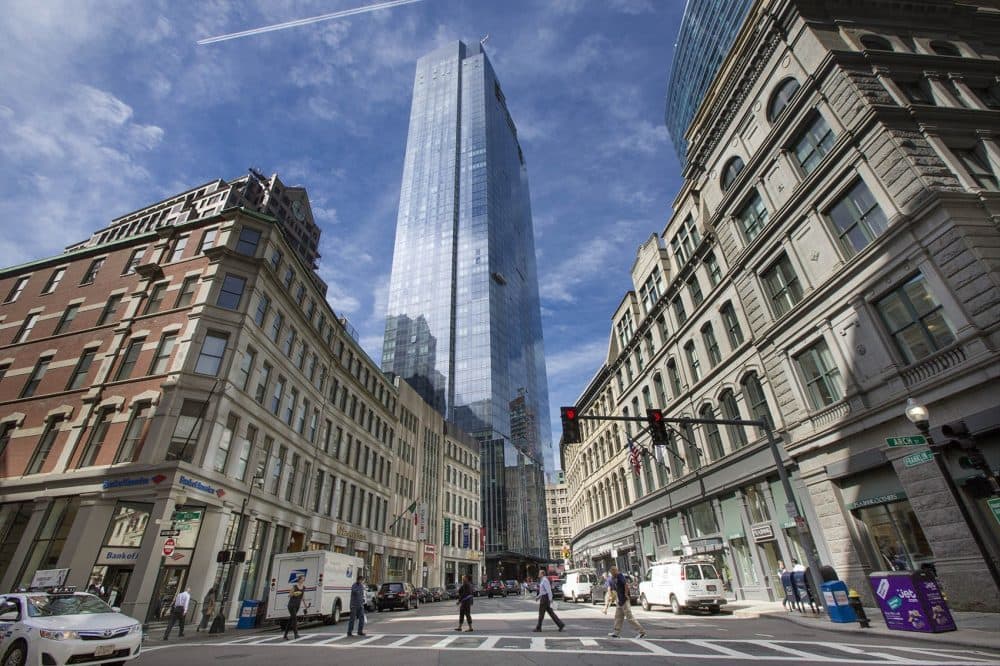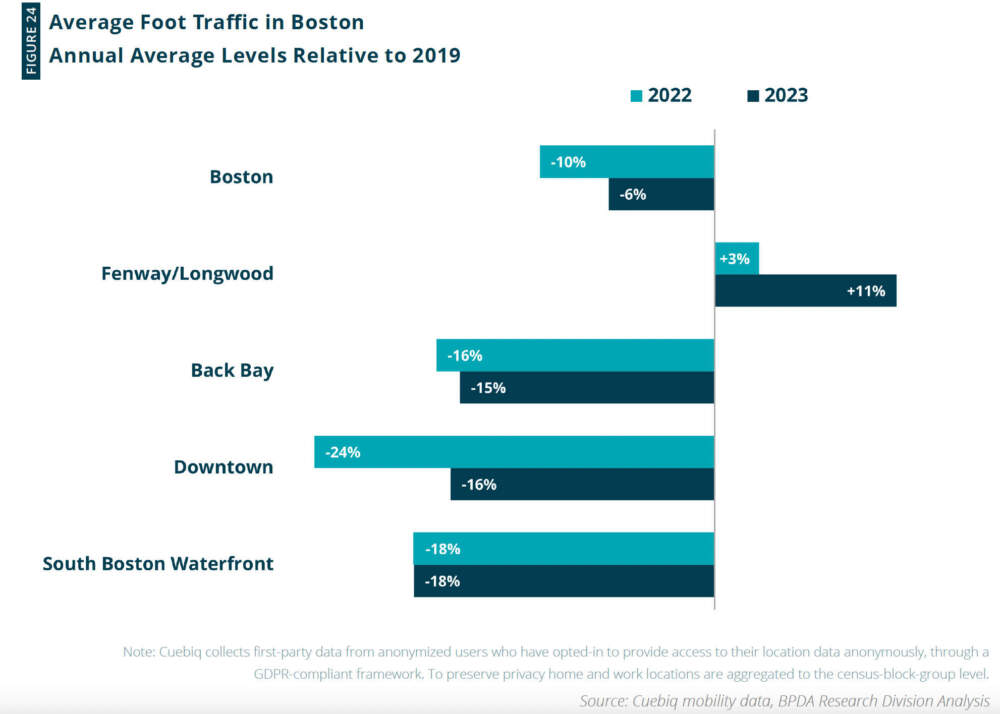Advertisement
Report finds strong economic growth — and challenges — in post-pandemic Boston

Boston's economic growth is strong with some key indicators — such as employment, consumer spending and tourism — rebounding or exceeding pre-pandemic levels, according to a new report released Tuesday by the Boston Planning and Development agency.
The report analyzes how the city has been recovering from the COVID-19 pandemic.
" The signs that we see in Boston are very encouraging," Mayor Michelle Wu told reporters at a briefing Monday. "That we continue to have extremely strong fundamentals for our recovery, that is due to the hard work that so many put in across many sectors in the city."
As the city continues to settle into a post-pandemic new normal, Wu said challenges such as housing affordability and empty office spaces remain. Here's a look at the report's findings on some economic indicators:
Employment
Boston gained 10,000 jobs in 2023, which pushed employment levels back to where they were in 2019, according to the report. Some sectors did better than others, however. Retail continues to lose jobs and ended 2023 with 2,391 fewer jobs than 2019, the report found. Accommodation and food services added 3,774 more jobs, but still remains below pre-pandemic levels. Meanwhile, health care and social assistance continues to grow and ended 2023 with 7,775 more jobs than in 2019.
The city's average unemployment rate was 3.2% in 2023 and below the national average, according to the report. That number fell to 3.1% by March of this year, the report noted.
Consumer spending
Overall average consumer spending in 2023 was 96% of what it was in 2019, according to the report. (It's worth noting, though, that when adjusted for inflation, consumer spending in 2023 actually fell compared to 2022). Consumers are spending their money on apparel and groceries, with those sectors largely recovering to 2019 levels. But, the report found, consumers are not spending at restaurants like they did before the pandemic.
Some neighborhoods are also seeing more consumer activity than others. Residential neighborhoods like Jamaica Plain, Roxbury, Hyde Park, Mission Hill and West Roxbury all have higher consumer spending levels in 2023 than in 2019. Meanwhile, commercial neighborhoods like Back Bay, Fenway, Downtown and Longwood have yet to fully recover when it comes to spending. That's likely because their "economies are more dependent on mobile populations" whose habits have changed because of the pandemic, the report said.
Of note, according to the report, is the Seaport, where consumer spending has made significant gains almost to the point of a full recovery. That may be due to increased convention activity, the report said. "Group meetings, conventions — we're booked up until 2037," Meet Boston executive vice president Hilina Ajakaiye said Monday. "So that's back for us."
Advertisement
Travel and tourism
International travel through Boston is now higher than it was before the pandemic, according to the report. The number of international travelers coming through Logan Airport now exceeds 2019 levels. And the report found domestic travel is back to where it was pre-pandemic.
Tourism has been driving the city's economic recovery, according to Segun Idowu, Boston's chief of economic opportunity and inclusion.
" These are folks that are supporting our downtown businesses, our Seaport businesses," Idowu said at Monday's briefing. "We're seeing all of this spending go not just to the commercial hubs of the city, but to our neighborhoods as well."
Boston's hotel occupancy rates continued to improve in 2023, but are still shy of 2019 rates.
Foot traffic
Overall foot traffic across Boston reached 94% of what it was in 2019, according to the report. But foot traffic in the city's commercial hubs remains lower than that, as remote and hybrid work have altered people's commutes.
Downtown Boston's foot traffic is about 84% of what is was pre-pandemic, according to the report. The city been trying to lure more people downtown through events, public art and a grant program to help small businesses fill vacant storefronts. That program has so far helped 61 entrepreneurs, mostly women and people of color, open businesses and create around 300 jobs, according to Idowu. The city is also trying to spur nightlife activity, especially downtown, to "draw more foot traffic, more consumer spending" and "keep Boston open 24 hours," Idowu said.
The Fenway/Longwood area does stand out among the city's commercial areas. It's the only one to full recover — and exceed — pre-pandemic foot traffic levels. The city's healthcare hub, where jobs are more likely to be done in-person, reached 11% higher foot traffic in 2023 compared to 2019, the report found.

Housing and real estate
On the residential side, Bostonians continue to face high rents and home prices as demand for housing continues to be strong. Meanwhile, inflation and interest rates have impacted the pace of new housing production, the report found. The BPDA is working to approve more multifamily units and has a zoning initiative it hopes will bring more affordable housing across the city, according to Idowu.
On the commercials side, retail vacancy rates are among the lowest in the country at 2.15%, according to the city. But empty office spaces continue to be a challenge and have not returned to pre-pandemic levels. By the end of 2023, office vacancy rates hit 12% in Boston, according to the report. The office vacancy rate is higher downtown at 14.4%, the report found.
Empty offices are a big problem for the city. A report projected the city could lose $1.4 billion in tax revenue over the next five years due to these empty offices. Wu is now seeking a commercial property tax rate increase to prevent an increase in residential taxes — an effort some business leaders and commercial property owners don't like. Wu said Monday that her residential tax relief effort is a "short-term" solution that would allow the city to "maintain stability among the tax base that the city has."
